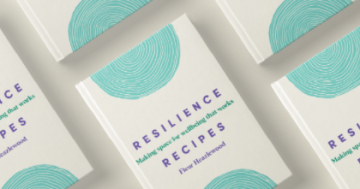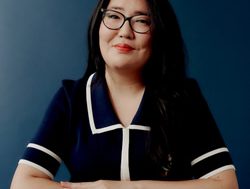Sarah Scopelianos and Kara Jensen-Mackinnon* say imposter syndrome hasn’t held these women back and explores why.
 Entrepreneur Kate Morris admits that sometimes there’s a “little voice” in her head attempting to sow seeds of self-doubt.
Entrepreneur Kate Morris admits that sometimes there’s a “little voice” in her head attempting to sow seeds of self-doubt.
Determined not to let it take over, she’s found a novel way to keep her imposter feelings in check.
“I’ve found it useful … to name that voice and separate it from myself in that way so that it’s not an inner voice of truth. It’s just Kevin, [as in] ‘you can zip it Kevin’,” she tells ABC RN’s This Working Life.
The founder of Adore Beauty isn’t alone.
The idea of the imposter syndrome was conceived by US psychologists Pauline Rose Clance and Suzanne Imes in 1978, and further research by Dr Clance and Gail Matthews in the mid-1980s found 70 per cent of people felt like frauds sometime during their working lives.
Expert Hugh Kearns thinks that number is likely to be much higher.
“I think the other 30 per cent are probably lying,” he says.
Mr Kearns, who lectures internationally on high performance, positive psychology and work-life balance, says people often feel “uncomfortable” doing something new or outside of our comfort zones.
Instead, it’s a feeling we need to embrace.
“What people think is ‘I have to get rid of that’. And what I’d be saying is, ‘No, you have to get used to that’.”
So can you tame your doubtful little inner voice? Is it possible to use it to your advantage? These people say you can.
Even an expert feels it
Being an authority on the subject doesn’t make you immune, as Mr Kearns explains.
His own inner voice nagged at him as he wrote his book The Imposter Syndrome: Why Successful People Often Feel like Frauds.
The Flinders University researcher says people who believe they are imposters or frauds at work often feel self-doubt, like they don’t belong or haven’t earned the right to be in the position they are in.
They also live in fear that others will discover their “secret”.
“You get into this whole catastrophising sort of thing … and that actually just makes doing anything hard.
“If your brain is having this little private conversation, there’s not many brain cells left to get on and do what you’re supposed to be doing.”
Early research focused on high-achieving women, while later studies found the feeling is felt equally between men and women albeit for different reasons — men fear failure while women grapple with self-doubt.
Ms Morris isn’t surprised.
She says imposter syndrome is yet another way women are made to feel as if they need to fix themselves in a world that wasn’t set up for them to succeed in.
“We are constantly trying to fight our way through all of the systemic and invisible barriers that are put in our way.
“The world is constantly telling us, you don’t belong here or you can’t do this.”
Imposter feelings vs imposter syndrome
There’s a difference between having imposter feelings and being crippled by the syndrome.
Mr Kearns says having self-doubt or questioning your ability is common when doing something new like starting a new job.
“For some people, the doubts become very persistent and hard to get rid of and take over them a little bit and they start to believe that that might be true,” he says.
However when it’s not an occasional feeling and becomes “a lot of the time”, it becomes a syndrome.
He says people with the syndrome either decide to work much harder than they have to or they avoid taking risks and miss out on opportunities.
“One of the ways to deal with it is to become …. happy enough with that sense of ‘I don’t know everything, it might go wrong [but] I can cope with mistakes and I can make it better.’”
It can be a good sign
Leticia Mooney, the founder of Brutal Pixie, a content and communications company, has another way to look at it.
She experiences imposter syndrome as a stream of thoughts questioning her ability before she is “flooded with confidence”.
“For me, imposter syndrome is really a moment of growth,” Ms Mooney says.
“It’s that sign that says ‘hey you’re about to do something that you’ve never done before’.
You feel like you’re not supposed to be here but actually you are supposed to be here — so just be confident about what you’re doing.
“Once you get through that moment, everything comes good and the imposter syndrome feeling, that anxiety, disappears.”
Journalist and author Ginger Gorman agrees.
She recalls waiting to take the stage in Norway to talk about her bestselling book Troll Hunting when her imposter syndrome’s voice washed over her.
“I [remember thinking] I’m just a fat mum in a headband, what am I even doing here?” Gorman says.
But she reminded herself that she’d been invited to the event because she was an expert. Then she went out on stage.
The sense of being an imposter is something she has battled since childhood, but she has chosen to see it differently.
“I think the idea that you are mediocre can actually be advantageous,” Gorman says.
It has driven her to work harder to learn and achieve.
She believes it has other benefits too: “It makes you a better listener. It makes you more compassionate and kind towards others and it makes you … much more able to be in a community and work with other people.”
How to deal with it?
Mr Kearns has a few tips to overcome any imposter feelings.
His first piece of advice is to recognise “there’s nothing wrong with you” if you feel doubt. Self-reflection can be a good thing.
He refers to the psychological concept that feelings are not facts, adding that someone can feel something “really strongly but that does not mean it’s true”.
He also recommends reminding yourself of your achievements.
That includes creating a “brag file” to collect “all the compliments you’ve ever received” and pulling it out whenever doubt creeps in.
“If you have 100 emails and 99 of them are good [and] one is bad – what do you spend the evening thinking about?” he says.
“[Instead] you need a fact file, all the evidence, because when you’re having doubts, you can’t remember the good stuff.”
Lastly, he suggests being brave and taking action.
“At some stage, you just have to jump off the edge of the swimming pool into the water – put the application in, put your hand up in the meeting and ask the question … because if you don’t do that, you miss out on so many opportunities.”
*Sarah Scopelianos is a digital producer and journalist with Radio National. She can be contacted on Twitter @scopelianos. Kara Jensen-Mackinnon is a creative producer and digital strategist with the ABC.
This article first appeared at abc.net.au.











